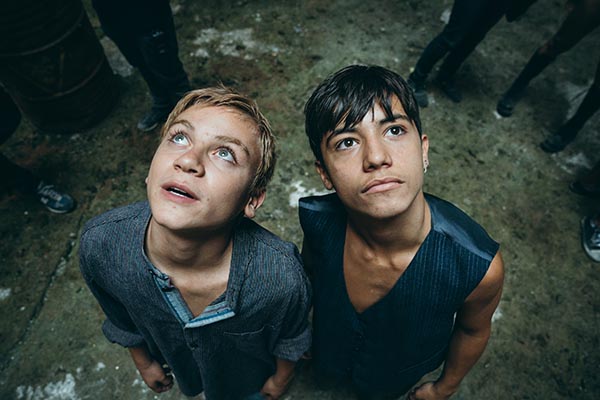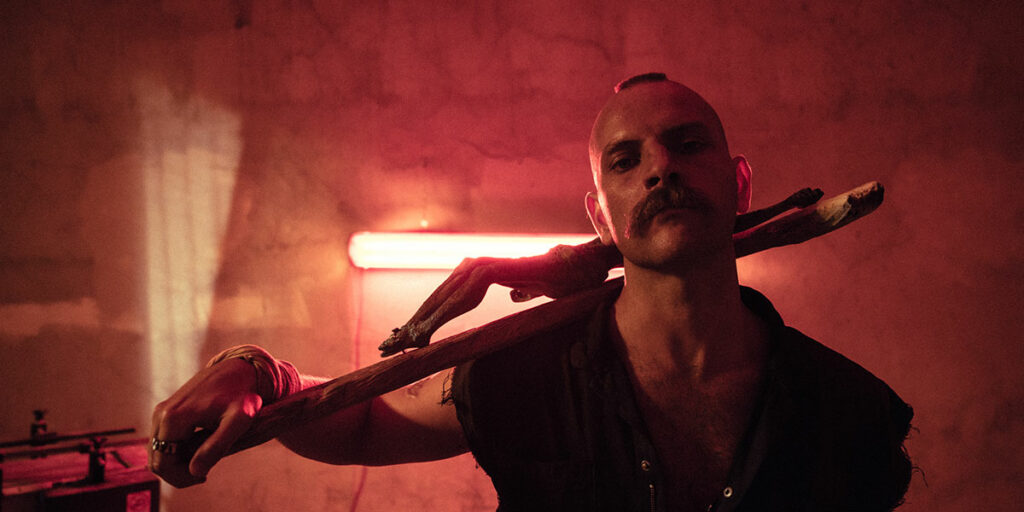Drawing on franchises such as Mad Max, Mondocane’s impressive worldbuilding and engaging story stand out even amongst its lack of originality and innovation.
In the near future, the city of Taranto, Italy has been cut off from the rest of the country due to contamination, giving birth to a new society where gangs run amok and crime is commonplace. Surrounded by barbed wire, there is seemingly no place for the citizens of Taranto to go. Mondocane (meaning ‘Dogworld’) centres on best friends Pietro and Cristian, born in this toxic wasteland and dreaming of someday escaping, or at least joining the local child gang, aptly named The Ants. Aside from a small dip in the middle, director Alessandro Celli keeps the thrills up for most of Mondocane, presenting a chilling vision of a dystopic future which is not too dissimilar from our present.
Pietro and Cristian’s seemingly unbreakable friendship begins to falter upon joining The Ants, a gang comprised of young children like themselves and led by the manipulative Testacalda, a man of terrifying charm who moves these young people about like pawns in his own game. Alessandro Borghi (Suburra) brings Testacalda to life with a deranged edge, unnervingly switching from alluring kindness to violence without hesitation. As the two youngsters, Dennis Protopapa and Giuliano Soprano showcase a great chemistry, first as best friends and then as enemies as their relationship disintegrates, with both young actors bringing different, complex elements to their characters.
Just as impressive as these characters is the world itself. Taranto is a gritty, decrepit place, soaked in sand, dust and smog and littered with all sorts of rubble and wrecks. It’s a breeding ground for crime and, despite the feeling that you’ve seen this sort of world before in other films, it feels no less tangible in Mondocane. DOP Giuseppe Maio (Anima bella) brings this world to life in vivid detail, drawing parallels between this world and New Taranto – a more civilised place – through the use of colour. The contaminated areas of Taranto are drenched in an orange hue, the sun barely making it through the haze, whilst New Taranto is brighter, sunnier, more idyllic. Fabrizio D’Arpino’s (The Tale of King Crab) production design and Laura Boni’s (Agony) art direction further cements this apocalyptic vision of pollution and crime.

On occasion, the story can feel scattered in Mondocane, flitting between the main story and subplots uncertainly, but the driving force of the central narrative – the Ants and its two new members – ensures the thrills rarely let up. Federico Bisozzi (Hypersleep) and Davide Tomat’s (Press) synth-heavy, droning score pulsates along with the action; it wouldn’t feel too out of place in a John Carpenter film. Indeed, Mondocane’s Taranto bears resemblance to the enclosed prison of Manhattan Island in Carpenter’s Escape from New York (1981). It is in these similarities to previous works where Mondocane both sings and falters; the dystopian world it builds is stunningly realised, but it feels familiar, adding little new to this subgenre.
Celli’s film might not be an innovative, ground-breaking piece of work, but it works well in what it sets out to be: an action thriller with interesting characters and memorable set pieces. There are rarely moments of boredom in this gritty, cyberpunk-style world, and when the surprisingly optimistic ending hits, the emotional connection with these young characters is more apparent than you might expect.
Mondocane is now available to watch on all major digital platforms.

